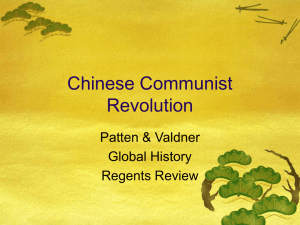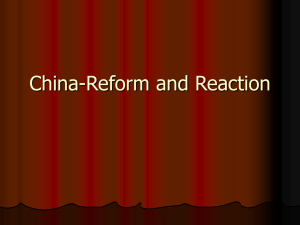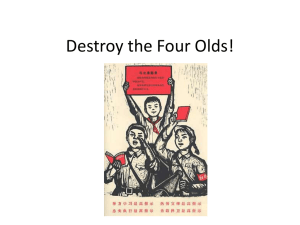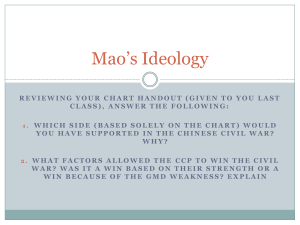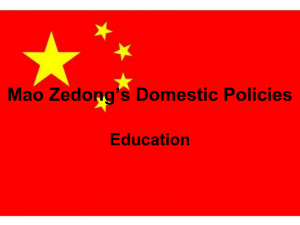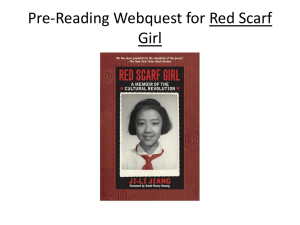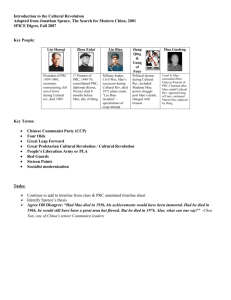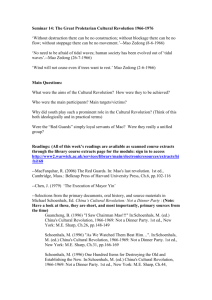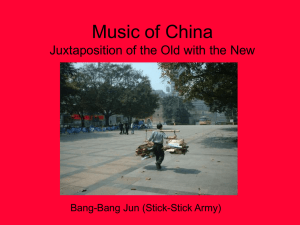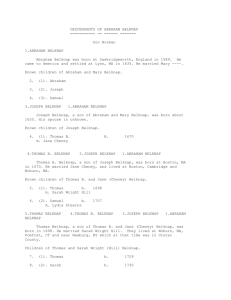Historians on Mao - ib world history Y2
advertisement
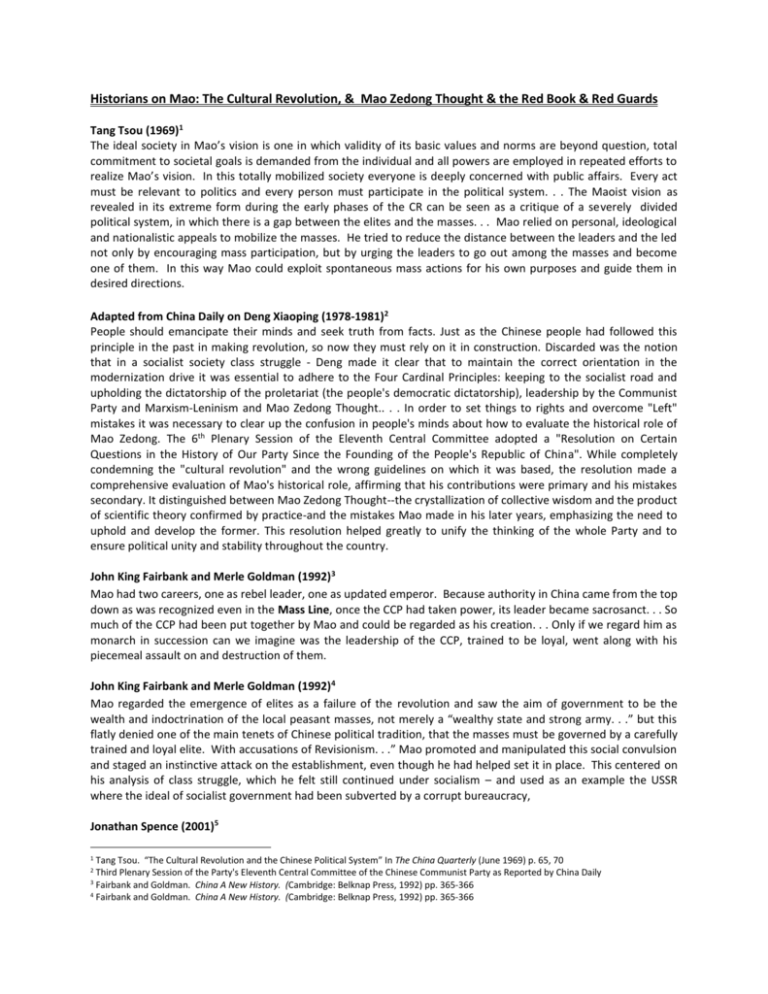
Historians on Mao: The Cultural Revolution, & Mao Zedong Thought & the Red Book & Red Guards Tang Tsou (1969)1 The ideal society in Mao’s vision is one in which validity of its basic values and norms are beyond question, total commitment to societal goals is demanded from the individual and all powers are employed in repeated efforts to realize Mao’s vision. In this totally mobilized society everyone is deeply concerned with public affairs. Every act must be relevant to politics and every person must participate in the political system. . . The Maoist vision as revealed in its extreme form during the early phases of the CR can be seen as a critique of a severely divided political system, in which there is a gap between the elites and the masses. . . Mao relied on personal, ideological and nationalistic appeals to mobilize the masses. He tried to reduce the distance between the leaders and the led not only by encouraging mass participation, but by urging the leaders to go out among the masses and become one of them. In this way Mao could exploit spontaneous mass actions for his own purposes and guide them in desired directions. Adapted from China Daily on Deng Xiaoping (1978-1981)2 People should emancipate their minds and seek truth from facts. Just as the Chinese people had followed this principle in the past in making revolution, so now they must rely on it in construction. Discarded was the notion that in a socialist society class struggle - Deng made it clear that to maintain the correct orientation in the modernization drive it was essential to adhere to the Four Cardinal Principles: keeping to the socialist road and upholding the dictatorship of the proletariat (the people's democratic dictatorship), leadership by the Communist Party and Marxism-Leninism and Mao Zedong Thought.. . . In order to set things to rights and overcome "Left" mistakes it was necessary to clear up the confusion in people's minds about how to evaluate the historical role of Mao Zedong. The 6th Plenary Session of the Eleventh Central Committee adopted a "Resolution on Certain Questions in the History of Our Party Since the Founding of the People's Republic of China". While completely condemning the "cultural revolution" and the wrong guidelines on which it was based, the resolution made a comprehensive evaluation of Mao's historical role, affirming that his contributions were primary and his mistakes secondary. It distinguished between Mao Zedong Thought--the crystallization of collective wisdom and the product of scientific theory confirmed by practice-and the mistakes Mao made in his later years, emphasizing the need to uphold and develop the former. This resolution helped greatly to unify the thinking of the whole Party and to ensure political unity and stability throughout the country. John King Fairbank and Merle Goldman (1992)3 Mao had two careers, one as rebel leader, one as updated emperor. Because authority in China came from the top down as was recognized even in the Mass Line, once the CCP had taken power, its leader became sacrosanct. . . So much of the CCP had been put together by Mao and could be regarded as his creation. . . Only if we regard him as monarch in succession can we imagine was the leadership of the CCP, trained to be loyal, went along with his piecemeal assault on and destruction of them. John King Fairbank and Merle Goldman (1992)4 Mao regarded the emergence of elites as a failure of the revolution and saw the aim of government to be the wealth and indoctrination of the local peasant masses, not merely a “wealthy state and strong army. . .” but this flatly denied one of the main tenets of Chinese political tradition, that the masses must be governed by a carefully trained and loyal elite. With accusations of Revisionism. . .” Mao promoted and manipulated this social convulsion and staged an instinctive attack on the establishment, even though he had helped set it in place. This centered on his analysis of class struggle, which he felt still continued under socialism – and used as an example the USSR where the ideal of socialist government had been subverted by a corrupt bureaucracy, Jonathan Spence (2001)5 1 Tang Tsou. “The Cultural Revolution and the Chinese Political System” In The China Quarterly (June 1969) p. 65, 70 Third Plenary Session of the Party's Eleventh Central Committee of the Chinese Communist Party as Reported by China Daily 3 Fairbank and Goldman. China A New History. (Cambridge: Belknap Press, 1992) pp. 365-366 4 Fairbank and Goldman. China A New History. (Cambridge: Belknap Press, 1992) pp. 365-366 2 However, despite official directives and encouragement from the Party leadership, local forces were left to act according to their own definitions, and many of them ended up inflicting violence upon their communities and clashing with each other. Nobody wanted to be considered a “reactionary,” but in the absence of official guidelines for identifying “true Communists,” everyone became a target of abuse. Some believe that this chaotic, violent response stemmed from the two decades of repression that the Party had imposed on China. . . people were obliged to sacrifice and remain completely obedient to the Chinese nation, and only Party members exercised direct influence over their own lives. Thus, to the youth of the day, the Cultural Revolution represented a release from all their shackles, frustrations, and feelings of powerlessness. It also gave them the freedom to enact revenge on those whom they believed exercised undue influence over them or whom they had been told were “class enemies Alexander Pantsov and Steven Levine (2007):6 It was Mao who ultimately made the decisions regarding the fate of individual party leaders. It was he who removed them from their government and party positions. Is it possible that Mao did not conceive of the scale of lawlessness, that he could have failed to understand where the universal permissiveness would lead? No, he understood everything perfectly and that is why he bears responsibility for the miserable fates of the victims. He was the chief culprit of the sensliess and merciless mass terror. More than a million people were totured, shot or driven to sucide during these years of “complete chaos under heaven” and a hundred million suffered to one degree or another. Only a small fraction were patry members or cadres. Mao knew everything and understood everything. Over a long period, not only did Mao fail to stop the outburst of anarchy; on the contrary he encouraged it in any way he could. An irrepressible lust for violence , clearly evidence as far back as his Report on an Investigation of the Peasant Movement in Hunan, (c. 1927) was never truly extinguished in MO. How could it have slackened when it was constantly reinforce by revolutionary struggles and reading of Marxist literature? All his life, Mao believed in the false formula that “without destruction there can be no creations.” 5 6 Jonathan Spence. The Search for Mao 2001 as adapted by Stanford for SPICE Curriculum Alexander Pantsov and Steven Levine. Mao: The Real Story, (New York Simon and Shuster, 2007)
